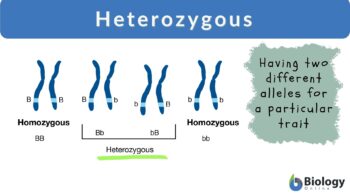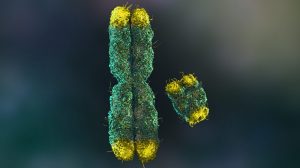
Heterozygous
adj.
[ˌhɛtərəʊˈzaɪɡəs]
Definition: Having two different alleles for a particular trait
Heterozygous Definition
adjective
(genetics) Of, or pertaining to an individual (or a condition in a cell or an organism) containing two different alleles for a particular trait
More Info on Heterozygous
The term heterozygous is used to describe a cell, a nucleus, or an individual organism that carries different or non-identical alleles for a particular trait at the same loci on homologous chromosomes. It means that the alleles that code for the same gene or trait are dissimilar, as opposed to homozygous wherein the alleles are identical.
An organism or a cell with two sets of chromosomes is called a diploid. One of the sets comes from the mother and the other set from the father. Each maternal chromosome has a corresponding paternal chromosome to match with based on their loci. When the loci in the matching chromosomes bear the same alleles, it is described as heterozygous. For example, a ‘heterozygous’ organism for a particular trait means that it possesses dissimilar alleles (e.g. Aa); one of the alleles is dominant and the other is recessive. The dominant allele, according to Mendel’s Law of Dominance, is the allele that will be expressed.
Word origin: Greek heteros (“two”, “other”, “different”) + zygous (of a zygote)
Compare:
See also:
Biology Tutorials:





